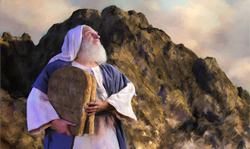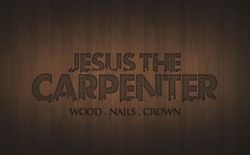Step 2: Relationship with God
 There are numerous verses throughout the books of Exodus, Leviticus, Numbers, and Deuteronomy that show us just how God pursued a love relationship with Moses that was real and personal.
In Exodus 24:12 "The Lord said to Moses, 'Come up to me on the mountain and stay here, and I will give you the tablets of stone, with the law and commands I have written for their instruction'" (NIV). The Bible continues to tell us that, "When Moses went up on the mountain, the cloud covered it, and the glory of the Lord settled on Mount Sinai. For six days the cloud covered the mountain, and on the seventh day the Lord called to Moses from within the cloud." (Exodus 24:15-16). Moses stayed on the mountain for a total of forty days and forty nights. Although the Bible does not tell us what type of relationship building went on during those forty days and forty nights, I can only imagine that Moses was experiencing some serious
 To become a servant of God we must understand how to respond to God's call. Blackaby discusses his seven realities of experiencing God through a unique illustration. The illustration below was taken directly from his book titled Experiencing God.
The first thing to remember is that God is always at work around us. He has a plan for our life that is nothing short of spectacular. We just have to build a relationship with Him so that he can put his plan for our life in action. Once we have built that relationship, God will invite us to become involved in His work, which is His spectacular plan for us. After His call to follow Him, God will speak to us to reveal what He has in store for us. What we must understand is that God does not always speak to us through the most obvious; sometimes he uses other avenues such as the Holy Spirit, the Bible, prayer, the church, circumstances, and others. What I'm trying to get at here is that we should not always expect to hear God's voice when He speaks. Once God has spoken, you can surely expect a crisis of belief to occur that WILL require faith and action, which leads to the next step of making major adjustments in our own lives to be able to join God in His plan. Through our obedience we can truly experience God.

The Seven Realities of Experiencing God
Step 1: God's Work
A perfect example of applying these seven realities is evident in the life of Moses. If you have the time, read Exodus chapters two through four for Moses background. To understand how God was already at work we have to go back to the first chapter of Exodus where we learn that Joseph and all his brothers have passed, but before they passed away they were very fruitful and populated the land with Israelites. "Then a new king, who did not know about Joseph, came to power in Egypt. 'Look,' he said to his people, 'the Israelites have become much too numerous for us. Come, we must deal shrewdly with them or they will become even more numerous and, if war breaks out, will join our enemies, fight against us and leave the country'" (Exodus 1:8-10, NIV). So the slavery began prior to Moses birth. which set the stage for God's plan for Moses.
If we look to Exodus 2:23-25 we see that the Isrealites were beginning to moan and complain to god about their situation. God heard their cries and remembered his covenant with Abraham, Isaac, and Jacob and was concerned for the Isrealites. Here again we see that God was already at work. Be assured that God is at work around you and He is pursuing you to have the relationship with him. Come back tomorrow for Step 2 and learn about Moses' relationship with God.
 Portions of today's loaf are adapted from Experiencing God by Henry Blackaby and Claude King.
We must first find out where the Master is before we can begin His work. Once we have located where God is, we can begin Our employment with God in the area He is working. Just like any good employer, God will reveal what His work and what your duties are under His employment.
Just like a tree, we cannot be turned into something beautiful until the carpenter has primed the tree preparing it for his hands to create a masterpiece. We too must be primed for God's work. "When God is about to do something through you, He has to get you from where you are to where He is. . . You cannot stay the way you are and go with God" (Blackaby, 1990).
God always reveals what He is about to do. The Bible tells us in Amos 3:3, "Surely the Sovereign Lord does nothing without revealing his plan to his servants the prophets" (NIV). We must be pliable and willing to allow God to shape us into something that He can use. Just like any employer/employee relationship, there will be times of disagreement about the job to be performed along with the location of employment. Just because we have these struggles does not mean that God cannot use us to do His work. Although Jonah was disobedient at first, God still used him in
 Portions of today's loaf are adapted from Experiencing God by Henry Blackaby and Claude King.
"I am the true vine, and my Father is the gardener. He cuts off every branch in me that bears no fruit, while every branch that does bear fruit he prunes so that it will be even more fruitful. You are already clean because of the word I have spoken to you. Remain in me, and I will remain in you. No branch can bear fruit by itself; it must remain in the vine. Neither can you bear fruit unless you remain in me. I am the vine; you are the branches. If a man remains in me and I in him, he will bear much fruit; apart from me you can do nothing" (John 15:1-5, NIV).
In a world that is always going in overdrive, sometimes we just need to stand still and remain in God. In John 15:1-5, Jesus tells us that we cannot bear fruit unless we remain in him. If we are busy spinning our wheels attempting to do God's work according to our will, we no longer are remaining in him, and therefore cannot bear any fruit. In essence, our labor is fruitless; BUT if we remain in him we will produce far more fruit than we could ever imagine.
How do we remain in God? The answer is a three step process of which the first two are easy and the third a little more difficult. The first step is to stay in the Word daily and look to God's instruction manual (the Bible) for all the answers. The second step is to have daily conversations with God through prayer. If you are not quite sure how to pray, start by just imagining you are sitting at a table with Jesus carrying on a conversation. Just start by telling God how your day was and how thankful you are that He sent his Son Jesus to die on the cross for your sins. The third step, the more difficult one, is that we must stand still and adjust our lives to God, allowing him to reveal Himself to us as he works through us. By doing this we are creating a love relationship with God, which will allow us to do what God has called us to do.
Once we have completed these three steps we then can find out where God is working and start spinning our wheels in that direction. "Whoever serves me must follow me: and where I am, my servant also will be. My Father will honor the one who serves me" (John 12:26, NIV). We need to be wherever the Master is and do whatever the Master is doing. Your motto should be, "Where you go I'll go, where you lead I will follow you!"
 Portions of today's loaf are adapted from Experiencing God by Henry Blackaby and Claude King.
"This is the word that came to Jeremiah from the Lord: 'Go down to the potter's house, and there I will give you my message.' So I went down to the potter's house, and I saw him working at the wheel. But the pot he was shaping from the clay was marred in his hands; so the potter formed it into another pot, shaping it as seemed best to him.
"Then the word of the Lord came to me: 'O house of Israel, can I not do with you as this potter does?' declares the Lord. 'Like clay in the hand of the potter, so are you in my hand, o house of Israel.'" (Jeremiah 18:1-6, NIV).
In this passage we see God telling Jeremiah to go without giving him all the details. I hope you are noticing this pattern from the previous lesson. God does not always gives us all the details. Even when we are not given the details, we need to still be moldable and pliable. "To be a servant of God you must be moldable and remain in the hand of the Master" (Blackaby, 1990). "Yet, O Lord, you are our Father, We are the clay, you are the potter; we are all the work of our hand" (Isaiah 64:8, NIV).
For us to be of good quality moldable clay we must do two things: be responsive to God and willing to be whatever vessel He calls us to be, and remain in God's hands so that we can be used how God chooses to use us. "When you come to God as His servant, He first wants you to allow Him to mold and shape you into the instrument of His choosing. Then He can take your life and put it where He wills and work through it to accomplish His purpose" (Blackaby, 1990). There is no greater purpose than having the Master form and shape you into the vessel of His choice. When we choose to shape ourselves we become marred and odd shaped vessels of little use; however, when we allow the Almighty Father to shape us we become beautiful vessels worthy of the Master's work.
I leave you with a few questions to ask yourself. Will you be obedient when God calls you to go without the details? Are you moldable clay? Are you a worthy vessel?
 Portions of today's loaf are adapted from Experiencing God by Henry Blackaby and Claude King.
Where do you search for the answers to all of life's questions? Do you first run to the internet? Or do you call a friend or relative to give you advice? Maybe you base your decisions based on previous experiences or an isolated case. The Bible tells us that we should seek God's response in the Scriptures for the answers to any pressing questions or situations that arise in our life. In Experiencing God, Blackaby states, "Christians are becoming more and more disoriented to the Bible as a guide for faith and practice. Because Christians have become disoriented to the Bible, they turn to worldly solutions, programs, and methods that appear to be the answer to spiritual problems" (Blackaby, 1990). With so many worldly options that seem like novel ideas at the time, it can become easy for us to be lead astray from the only book that contains all the answers - God's Living Word. We should always search the Scriptures to see what God has to say, and base our decisions on Biblical and Godly principles.
Why should you trust the Bible to give you the answers that you seek? The answer can be found in 2 Timothy 3:16, "All Scripture is God-breathed and is useful for teaching, rebuking, correcting and training in righteousness, so that the man of God may be thoroughly equipped for every good work" (NIV). The Bible is our safeguard against the false teachings of the world.
So the next time you are not sure what the correct response to a situation that you are experiencing would be, run to the Bible FIRST before you travel down the road of options available. God's Word will never lead you down the wrong path because His GPS (God's Planning System) is the ultimate road map for life!
 Today's feeding is adapted from Unit 1, Day 1 of Experiencing God by Henry Blackaby and Claude King.
We all have questions regarding what is God's will for your life. I sometimes pray and ask God to show me his will for my life, and guide me in the direction to the path I am to walk. After studying Blackaby's book, I have come to realize that I have been doing it wrong the whole time. I should not ask God to give me the detailed coordinates to put in my GPS of life, instead I need to trust Jesus one day at a time and stay in the center of God's will. Thomas, one of the disciples asked Jesus, "Lord, we don't know where you are going, so how can we know the way? Jesus answered, 'I am the way and the truth and the life. No one comes to the Father except through me. If you really knew me, you would know my Father as well. From now on, you do know him and have seen him.'" (John 14:5-7, NIV).
Essentially we need to arrive at the place where we walk by faith and not by sight. God does not always give us step by step directions, and sometimes he doesn't give us any directions at all. God may call us to just go or leave, and trust that He will make sure we arrive at the destination He has chosen for us. Take for example Abraham. In Genesis 12:1-5, God told Abram (later God changed his name to Abraham) to "Leave your country, your people and your father's household and go to the land I will show you. ...So Abram left, as the Lord had told him; and Lot went with him. Abram was seventy-five years old when he set out from Haran. He took his wife Sarai, his nephew Lot, all the possessions they had accumulated and the people they had acquired in Hara, and they set out for the land of Canaan, and they arrived there" (NIV). God did not give Abraham clear directions, He said go and Abraham went. If God calls you to go, will you be as obedient as Abraham or will you want all the coordinates and information about where you are going?
"But seek first his kingdom and his righteousness, and all these things will be given to you as well. Therefore do not worry about tomorrow, for tomorrow will worry about itself. Each day has enough trouble of its own" (Matthew 6:33-34, NIV). Jesus is your ultimate GPS! Follow him and your reward will be great in Heaven for God tells us in his Living Word that, "Everyone who has left houses or brothers or sisters or father or mother or children or fields for my sake will receive a hundred times as much as will inherit eternal life" (Matthew 19:29, NIV).
Your call is to follow God one day at a time and trust that He will ensure you arrive at the destination He has called you to. Your prayer for today should include asking God to give you the courage not to worry about tomorrow and the strength to trust that Jesus is your ultimate GPS and he will guide you one day at a time to your destination.
|








 RSS Feed
RSS Feed